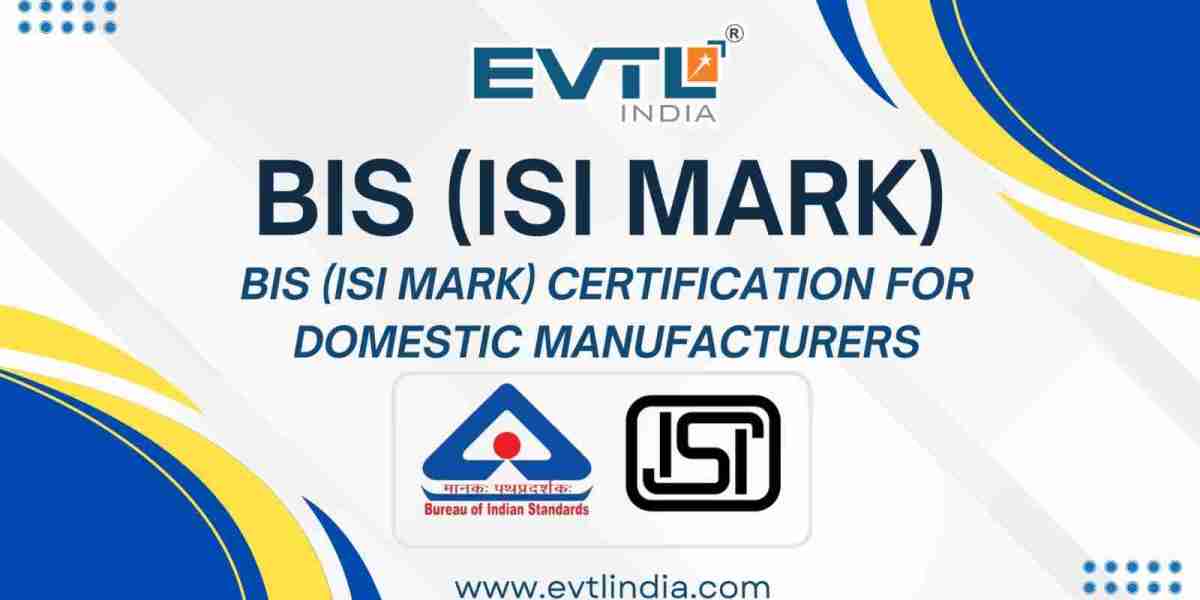In India, ensuring product safety, quality, and compliance with national standards is not just an option—it is a necessity. The ISI Mark stands as a trusted symbol of quality, introduced by the Bureau of Indian Standards (BIS). From electrical appliances to cement, the ISI Mark has become synonymous with reliability and adherence to Indian standards. For manufacturers, obtaining ISI Mark Certification is a strategic step toward consumer trust and regulatory compliance.
This blog provides an in-depth look into ISI Mark Certification, the process of ISI Mark Registration, and how an ISI Consultant can simplify the journey for manufacturers.
What is the ISI Mark?
The ISI Mark is a certification mark issued by the Bureau of Indian Standards (BIS), signifying that a product complies with Indian quality and safety standards. Introduced in 1955, it is one of the oldest and most respected certification marks in the country.
Products bearing the ISI Mark are tested and approved based on relevant Indian Standards (IS codes). Consumers rely on this mark as an assurance of durability, safety, and performance.
Importance of ISI Mark Certification
Consumer Safety: Products with ISI Certification meet strict quality standards, ensuring end-user safety.
Market Access: Certain products cannot be sold in India without an ISI Mark, as mandated by BIS.
Brand Credibility: The ISI Mark enhances brand reputation, giving businesses a competitive edge.
Legal Compliance: Many categories like electrical equipment, steel products, cement, and household goods must legally carry the ISI Mark.
Customer Trust: With rising awareness, consumers often prefer ISI-marked products over uncertified alternatives.
Products That Require ISI Mark Certification
BIS has made ISI Mark Certification mandatory for a wide range of products under its Mandatory Certification Scheme. These include:
Electrical appliances (switches, cables, heaters, refrigerators)
Cement and steel products
Automotive tires and tubes
Gas cylinders and regulators
Kitchen appliances and utensils
Packaged drinking water and bottled water
Failure to obtain ISI Mark Certification for mandatory products can lead to penalties, fines, and a ban on sales.
The Process of ISI Mark Registration
Getting an ISI Mark requires a structured process. Below is a step-by-step breakdown of ISI Mark Registration:
Application Submission:
The manufacturer must submit an application to BIS along with details of the product, manufacturing process, and required documents.Product Testing:
Samples of the product are sent to BIS-recognized laboratories for testing against relevant Indian Standards.Factory Inspection:
BIS officials conduct a thorough inspection of the manufacturing facility to verify production capability, quality control measures, and compliance with standards.Certification Grant:
If the product and factory comply with the requirements, BIS grants the ISI Mark Certification. The manufacturer can now use the ISI logo on certified products.Surveillance and Renewal:
Regular audits and product testing are carried out to ensure ongoing compliance. Certification is valid for one year and must be renewed periodically.
Documents Required for ISI Mark Certification
To complete the registration process, manufacturers must submit:
Business license and company details
Manufacturing process flowchart
Product specifications and technical details
Test reports (if available)
Factory layout and quality control system documents
Proof of manufacturing facilities and machinery
Proper documentation ensures smooth approval and reduces delays in certification.
Role of an ISI Consultant
While the process of ISI Mark Registration may sound straightforward, it involves technical details, regulatory formalities, and rigorous inspections. This is where an ISI Consultant becomes invaluable.
An experienced consultant helps in:
Identifying applicable Indian Standards for the product
Preparing accurate documentation
Coordinating with BIS officials for factory inspections
Managing product testing at recognized labs
Ensuring timely certification and renewals
By hiring an ISI Consultant, manufacturers save time, avoid errors, and ensure smooth certification without unnecessary delays.
Benefits of ISI Mark for Manufacturers
Market Acceptance: Easier entry into both domestic and government procurement markets.
Reduced Risk: Protection against penalties for non-compliance.
Improved Quality Control: Standardized production processes enhance efficiency.
Export Opportunities: Some foreign buyers prefer Indian products with ISI Certification.
Consumer Preference: Boosts sales due to trust in certified products.
Challenges in ISI Mark Certification
Despite its benefits, manufacturers often face challenges such as:
Complex paperwork and technical requirements
Time-consuming product testing procedures
Lack of awareness about applicable standards
Regular surveillance audits and renewals
With professional guidance, these challenges can be managed effectively, ensuring long-term compliance.
Conclusion
EVTL India is one of the leading BIS Consultant in India, helping manufacturers obtain their BIS licences hassle-free. The ISI Mark Certification is more than a regulatory requirement—it is a symbol of quality and safety trusted by millions of consumers in India. For manufacturers, obtaining the ISI Mark is a critical step to building credibility, accessing wider markets, and ensuring consumer satisfaction.
However, the process of ISI Mark Registration can be complex without proper guidance. This is why partnering with a professional ISI Consultant makes a significant difference. With their expertise, manufacturers can navigate BIS standards smoothly, ensuring compliance and long-term business success.








